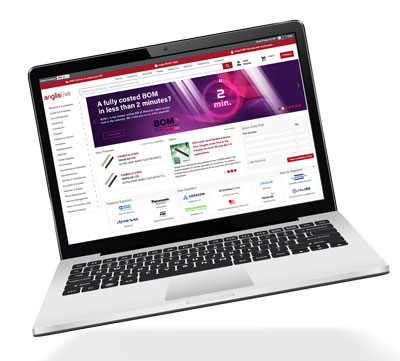
Technology startups need a secure supply chain to help them grow
After two years of unparalleled business uncertainty, there’s finally a hint of spring in the air and wise technology start-ups are already putting out the feelers to ensure that a weak supply chain won’t hamper their businesses’ rapid growth. Supply chain isn’t their core expertise though, and distributors need to help to ensure that they can get their products into the hands of customers quickly, in line with their business plan.
Technology startups with an innovative, market-leading and possibly life-saving product (Figure 1) on the drawing board, need to focus on the detail of testing and tweaking the product so that it delivers the functionality its prospective customers are seeking. But in the adrenalin rush of product development, it’s easy to forget that getting the right components is not just about the technical specification: it’s also about making sure parts can be delivered in the right time frame for the product to be launched into the market and delivered.

The supply chain environment for startups
The current global economic and political situation is having a dramatic impact on the supply chain for electronic components (figure 2). Pent-up demand coupled with scarce raw materials means manufacturers are seeing significant increases in prices. At the same time, freight charges are increasing globally, and delivery times are extending even when the stock is in the warehouse. And there is no end in sight to this uncertainty. For startups this issue is particularly acute, as they may not be at the top of the list for urgent deliveries when the long-awaited components finally become available. What if there are two or three components that are crucial to their device but also essential to devices made by much larger players?

This climate is presenting a unique challenge for technology startups, and many small entrepreneurial ventures may not have the necessary expert knowledge to work through the supply chain problems which are, in my experience, unprecedented. There is a popular misconception that because devices for 50 prototype and field trial units pre-production were sourced without difficulty, then mass production of 50,000 can be managed also. Quite often, startups have little or no supply chain expertise. It is written in their business plan as an outsourced function: ‘somebody else’s problem’. But when they end up with a one year plus hiatus where their EMS provider simply cannot source a 50,000 build for a brand-new product in line with the planned launch date it becomes very much their problem. Worse still, the build cost projections created one or two years ago can be completely out the window by the time the components required do appear.

As things stand, I don’t see the position on lead times improving until well into 2023. Customers whose design is six months away from being released on the market need to start placing production orders for the bill of materials as soon as possible. Of course, the investment risk when placing firm orders for components to fulfil demand that is hard to forecast and in any case is at least six months away is considerable (Figure 3). Although there is a huge demand for new technology in the medical, communications, security and low-carbon sectors (such as electric vehicles), few new businesses can afford to take on such commitments when future orders are uncertain, no matter how much faith they have in their new product.
The ‘technology adviser’
As seen during the pandemic, the supply chain can really rise to the challenge of, for example, delivering ventilators. Equally, it can also break down dramatically, just when it’s needed the most. Anglia has always provided extensive technical support for customers – but startups also need logistical support and supply chain know-how. Anglia’s dedicated division for startup customers, Anglia Unicorn (Figure 4), provides both and can help mitigate these issues. For example, they will help in specifying modifications to the BoM based on what can be sourced more readily, identifying early on ‘risk’ items, or amplifying the customers voice and negotiating future demand requirements on their behalf directly with suppliers ahead of launch date requirements. Effectively, to startups, it is a ‘technology adviser’ sitting alongside their legal and financial advice teams.

In working with startup customers, the Anglia Unicorn team is backed by Anglia’s considerable expertise in watching the market to identify emerging trends and help manufacturers of all sizes to keep up with ever-shifting supply chain priorities. It is also backed by Anglia’s exceptionally strong inventory position. As a privately owned business, Anglia maintains high levels of inventory as a proportion to the size of its business, and where key customers including startups have particular needs then its holdings of critical devices can be increased. To address COVID and the current supply chain uncertainty, Anglia has ramped up its inventory further to support customers.
Conclusion
There is no doubt that the supply chain can make or break a startup, but that’s not where their expertise lies. The technology startup’s job is to design and deliver great products, often turning their market upside down. Distributors like Anglia have a major role to play in ensuring that their inspiration isn’t strangled early by inward supply chain issues. Working together in this way enables everyone to prosper.

